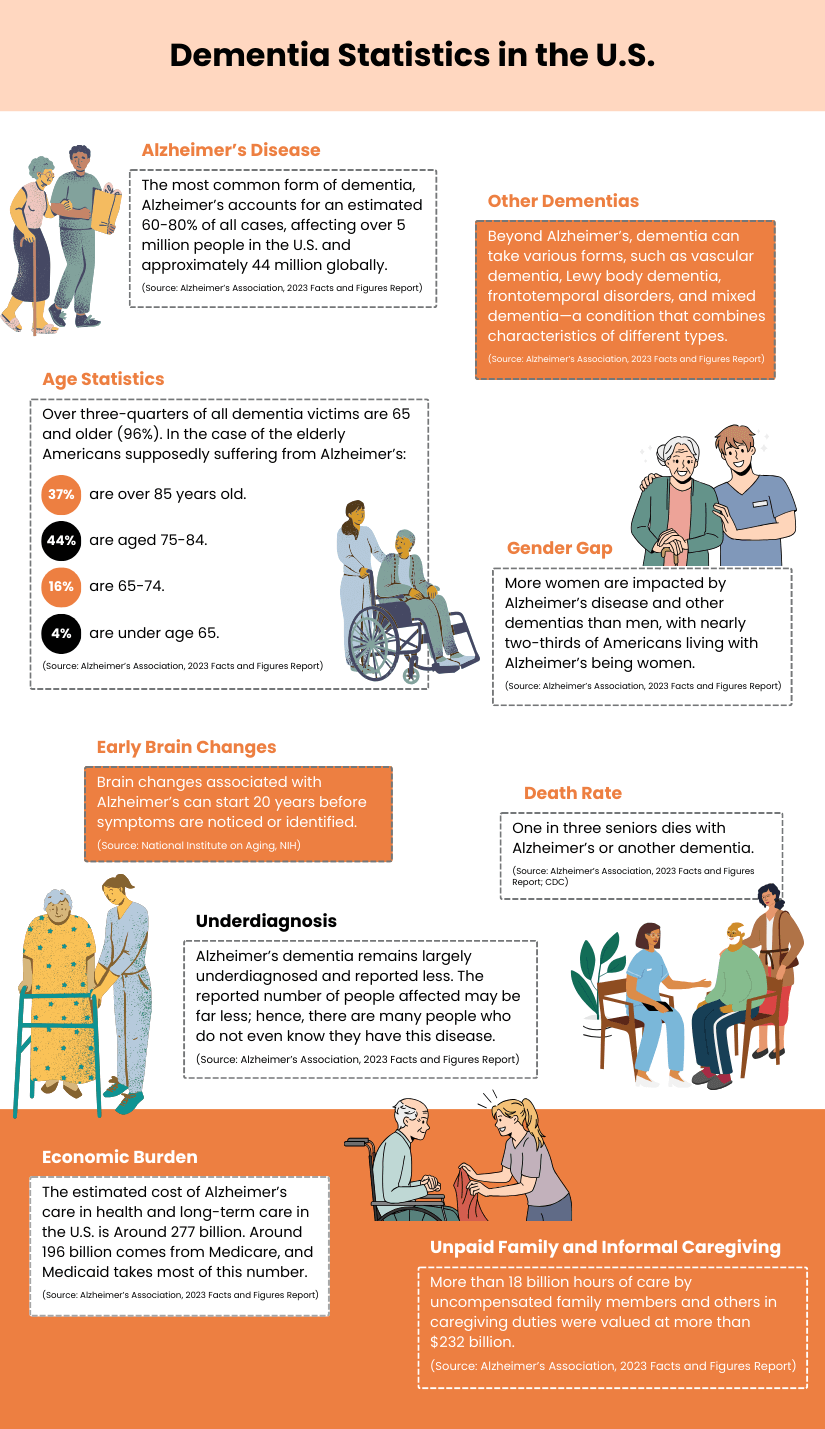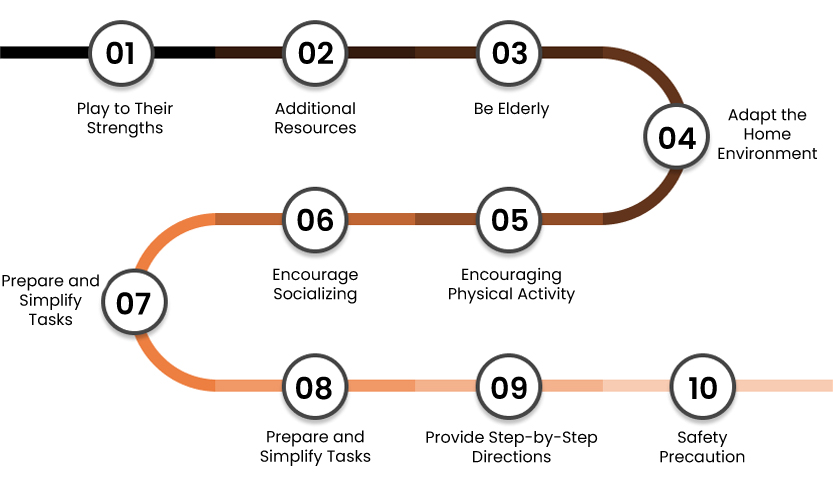
Imagine a world in which every day brings with it a new reality and new problems, and yet, within the heart, the desire to be free remains. This is the world in which the elderly with dementia live. Now, dementia is a general term describing a group of symptoms, such as difficulties with memory, language, problem-solving, and other cognitive abilities, with impairment severe enough to affect daily living. This can happen when there are the following conditions:
The most common form of dementia results from Alzheimer’s disease, accounting for 60-70%, although other conditions can also produce symptoms of dementia.
Generally, dementia occurs in people over 65 years of age, though the older the person, the greater the risk. On the other side, it is estimated that around the world, some 50 million people either have or suffer from different forms of dementia. It is estimated that around 10 million new cases come up every year. In the UK, for instance, an estimated 750,000 people are suffering from dementia, with the number probably rising to 1.4 million by 2039.
Keeping those affected independent must be one of the major fights against the disease. As a result, independence would improve their lives, almost like ensuring dignity and enhancing life quality to the maximum extent possible.
So, in this blog, let’s look at some ways to promote independence for those suffering from dementia and perhaps share some insight that will greatly benefit them.

Currently, there is no known cure for dementia; it remains very crippling for the elderly and their families. Online dementia training is, therefore, very useful in helping caregivers gain the necessary skills and knowledge to provide quality care empathetically.

Often, the activities for those with dementia have to be well planned given the physical and cognitive deficits that happen in dementia. Instead of providing recommendations for tasks likely to overwhelm the elderly or that they will not be able to accomplish, one should focus on building upon their existing abilities and adapting the activity accordingly.
For example, if your client likes to cook but cannot complete a whole recipe due to a cognitive deficit, then a more manageable task may be to pre-measure her ingredients or choose a dish with fewer steps in its recipe. You reduce frustration, confusion, and possibly aggression by ensuring the activities remain within their capabilities. This helps them maintain independence and enhances their self-esteem by being able to do what they like to do.
Many government agencies, non-profit organizations, and community groups provide resources, such as the dementia caregiver guide, to help older adults, especially those with dementia who desire to stay independent. There are assistive devices, like ergonomic-handled utensils and pill organizers, which make daily activities easier or facilitate them in general, or home modifications such as grab bars and ramps.
In addition to physical tools, services support meal delivery programs, virtual dementia training, transportation assistance, and in-home care. These will greatly decrease the burden of caregiving while allowing your client to stay at home securely. Plus, your client can feel more secure and comfortable living life, even as dementia advances.
As dementia progresses, a client may need more time to complete tasks or show forgetfulness in everyday activities. These stages require caregivers to show a great deal of patience. One should take their time with tasks when having problems because that will increase dependence and frustration.
Rather than “jumping in,” encourage the individual to do as much as possible for themselves but take extra time. If the person is dressing themselves but is slow, try providing verbal prompts and an opportunity for them to complete the task all by themselves, only physically stepping in if the individual is at risk. In most cases, if the caregiver is Elderly, the individual will feel secure and capable and remain independent. Taking online dementia courses can also help you continue to develop your approach.
As memory and spatial awareness decrease in a person, adapting to the living environment becomes more important in meeting your client’s requirements. Moving around the home may be supported by reorganizing furniture to clear access pathways and placing commonly used items in accessible locations.
For instance, you may leave utensils on the kitchen counter rather than in a drawer so that they are visible and accessible. Label cabinets and drawers with pictures or words to help remind your client of where items are stored. These small modifications might help keep your client safe and make daily tasks less effortful, allowing them to continue doing things for themselves.
Exercise is very critical to anyone with dementia because of improved blood circulation, which contributes to brain stimulation, in turn slowing the progression of dementia. The activities should be modified according to their abilities and monitored for general safety.
For instance, light activities like walking, stretching, or gardening will help them be physically active without over exhaustion. Regular physical activity will also help them lift their mood and well-being, eventually encouraging them to get involved and be less dependent on carers.
Socialization can decrease the loneliness of someone with dementia and can stimulate reinforcement of the mind. Encourage your client to participate in community activities, group outings, and regular visits by friends and family. These contacts enhance self-esteem and motivation, making them feel more connected and willing to cooperate in meaningful activities.
For instance, visiting the local senior center or linking with support groups can offer meaningful social engagements. The more connected your client feels with others, the more likely they will be active and independent for as long as possible.
Think of it this way: What will the client need help with? In advance, simplify the steps involved in the activity. For example, if brushing their teeth is a problem, set up the toothbrush with toothpaste on it on the sink so all they have to do is pick up the toothbrush and brush.
Also, having the clothes laid out in order or having all the ingredients on the counter for a simple meal helps them accomplish these tasks independently. Breaking down tasks into small steps can make your client feel quite independent and self-sufficient; it becomes more manageable.
Let your client try things independently first and then stand nearby to assist as required. For example, if they become confused with tooth-brushing, you could try a modeling or demonstration exercise by brushing your teeth right next to them and say or do something like brushing your teeth right next to them or provide a gentle prompt, such as “What next with the toothbrush?” This stepping-back-but-being-available method means they stay present with their ability as much as possible without anything being too burdensome or moving too quickly.
If the previous activity is very difficult for your client, chunk the activity down and provide direct instruction. For instance, if you teach them to brush their teeth, you would say, “First, put the toothbrush on your teeth. Then, move it back and forth like this. Now take a drink of water and swish.” After giving each instruction, stop and give them a chance to complete the action themselves. This makes them not feel that they are being rushed; neither are they being pushed over when not necessary. This will also enhance their independence and self–fulfillment in completing tasks. Communication during such circumstances is also of great importance. You can enroll in online courses for dementia to learn the techniques for improving communication with your clients.
You should observe safety as you make them independent. Keep a distance, but be close when they need you if something arises. Do not waver on them. For instance, the freedom to use a cold water bucket for teeth brushing, so they don’t get burns on their face but still have to space away to finish the task on their own. This will be a safe and independent way of maintaining dignity and confidence against mishaps. From various dementia caregiver training programs, you can access resources with practical advice on creating an environment that’s easy to move around and supportive for the elderly.
As dementia advances, the patient may need more assistance to remain independent. Fortunately, technology has proven to be an efficient aid for those with dementia, allowing caregivers to have new ways of facilitating their loved ones or clients in remaining independent for as long a time as possible. Some technological aids that can promote safety, communication, and independence for people with dementia are outlined below.
Electronic calendars and reminder software can also help people with dementia organize their everyday activities and appointments. Easy-to-use software such as Google Calendar or Apple Calendar, or specific software such as Medisafe to remind people to take medication or Alzheimer’s and Dementia Caregiver Buddy can remind a person of significant events. Triggered reminders of activities, doctor appointments, or social events can be programmed by carers so patients with dementia aren’t mentally loaded. Even the application has room to track activity remotely to make progress checking easier and send reminders as required.
GPS tracking and crisis alert systems are priceless in maintaining the safety of individuals with dementia as they lose their capacity to roam about known places. GPS tracking devices using wristbands or necklaces enable caregivers to track their relatives when they get lost or disoriented. The devices reassure them since they allow persons with dementia to experience autonomy, such that they can go out or walk without continuous supervision. Emergency alert systems must also be installed. Systems such as Life Alert or Medical Alert give immediate access to assistance during an emergency. The systems usually have pendants that one can press should they be unwell, fall, or require assistance. Some even have fall detection units that will call automatically for aid should the wearer fall so that help can be sent out quickly.
Voice assistants, such as Amazon Alexa, Google Home, and smart speakers, are a blessing for individuals with dementia. The speakers can be instructed to remind the patient to eat, take medication, or perform other activities of daily living. They can also be used for entertainment, such as music, audiobooks, or radio shows, to stimulate and calm the brain. In addition, carers can remain in contact with their relatives by phone or text through voice assistants without using complex technology.
Medication may prove challenging to monitor for individuals with dementia because of forgetfulness or disorientation. Smart pill bottles like the Tespo or PillDrill have an alarm or light notification to prompt the individual to take a dose. Some pills even have the feature to automatically dispense the correct dose, excluding the possibility of missing or wrong doses. Pill dispensers can contribute significantly to avoiding drug errors, which are frequent in individuals with cognitive impairments.
There are many software packages created to challenge the brain and retard cognitive decline in people with dementia. Programs such as Lumosity, CogniFit, or Peak provide exercises in memory, attention, problem-solving, and other cognitive function skills. The exercises and games are all created to challenge people and put their brains through their paces in a fun and safe manner. Mental stimulation can retard symptom progression and give a sense of achievement and empowerment.
Home automation systems, such as bright lights, smart thermostats, and motion detectors, can help provide a safe and comfortable living space for individuals with dementia. Motion-sensing lights, for instance, can be fitted in the bathroom or doorways to prevent nighttime falls, and smart thermostats ensure that the house remains at a comfortable temperature without any interference from the individual. Smart door sensors and smart locks also send reminders to caregivers when the individual tries to exit the home, offering a greater sense of security.
Telemedicine clinics are also gaining popularity, particularly among seniors with mobility issues. Virtual consultation by a specialist or doctor enables persons with dementia to be treated within the comfort of their homes. Not only is this convenient, but people can also receive the necessary treatment without the hassle of transportation. Caregivers also benefit a lot from the services, and advice and counseling are offered over the web when needed.
Empowering a person with dementia to live as independently as possible is an invaluable way to improve their quality of life. Providing meaningful care to the elderly entails considering their ability, adjusting the environment to the situation at hand, and a lot of patience. However, it often takes special knowledge and skills to help someone navigate the challenges of dementia care.
This is where Learn2Care can help. Our online training can help you manage dementia care more effectively. Gain practical strategies for dementia care with our online dementia course and improve communication with those in your care.
With Learn2Care, you can access expert-designed resources for dementia training tailored for long-term care. The courses are well thought-out to equip you with the knowledge and tools to support patients safely and effectively in leading their lives as independently as possible. Check out our courses today and start your growth journey for experience in caregiving.
Contact us to inquire about our state-wise training courses and take the first step towards upskilling your team with a 14-day free trial!